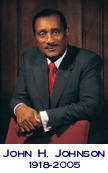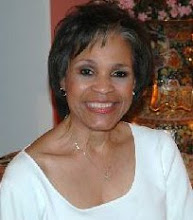
One Sunday afternoon last winter, I walked out of a movie theater so overwhelmed by Hotel Rwanda's larger than life inhumanity that I dared not get into a cab. I was thoroughly convinced that my emotional energy could not fit inside an automobile. Instead, I walked the mile home so that the Chicago “hawk” could snatch my grief, shake it into tiny harmless packets, and lift each one skyward.
Perhaps they showered me as pure joy months later, as I left the inspiring funeral service of Ebony magazine founder, John H. Johnson. The regal service celebrated the grandson of former slaves, who was born into the inhumanity of the Jim Crow South, and whose destiny was pre-determined. To ensure that black children in Arkansas City, Arkansas received no more than an eighth grade education, there was no high school in town. Like everyone else, Johnson was expected to toil in the cotton fields for the rest of his life.
As President Bill Clinton remarked during one of the service’s frequent moments of levity, “Rural Arkansas City has only one road in—and one road out. No one ever goes there by accident; no one ever leaves by accident.” So we can imagine that it was with great intention that 15-year old John and his mother, Gertrude, took the only road out of Arkansas City in 1933 and joined the Great Migration north, where a black boy was allowed to attend high school.
Perhaps by example or genetics, his widowed mother’s bold determination to live outside the limitations of racial bigotry emerged within Johnson. He nurtured this innate ability to see far beyond the footlights of America’s apartheid theater, moving in faith, knowing no fear, overcoming barriers faced by no American publisher before him, and earning the designation as the greatest among them. And that is how he is remembered.
One after another, some of the nation’s best-known political, business, and religious leaders’ tributes honored this humble man who ignored the appearance of obstacles, and persisted through any that managed to grab his attention. They told classic stories of his tenacity.
"Failure is a word I don't accept."
When automakers refused to advertise in Ebony, for example, Johnson sent a salesman to Detroit every week for more than two years, until a signed contract materialized. When he wasn't allowed to buy a parcel of land in downtown Chicago because of his race, he hired a white attorney who bought it in a land trust. Then he built the first Black-owned downtown office building. Failure is a word Johnson didn't accept.
It was Johnson who lifted the curtain of racism and exposed untold numbers of successful professionals in the Black community who had been declared non-existent by major media. He documented them in words and pictures, and empowered black girls and boys who grew up with Ebony and Jet magazines on their living room cocktail tables to see greater possibilities for themselves. Johnson then financed these young people's dreams with his dollars, funding the civil rights movement to open doors for them, and donating millions to college scholarship programs so that they could open doors for themselves.
From the welfare rolls as a child, Johnson became one of the wealthiest men in America and the recipient of the nation's highest civilian honor, the Presidential Medal of Freedom. Formerly denied a high school education, he later held more than 30 honorary doctorates from universities throughout the country, including Harvard, where he served on the advisory board of its prestigious business school. In 2003, Howard University named its communications school in his honor.
At his funeral, famous men recalled him as a tenacious salesman, no-nonsense businessman, tireless executive, task master, humorist, philanthropist, visionary, loyal friend, mentor, and loving family man. No one called John Johnson a prolific metaphysician; but clearly, he was every bit of that. He understood the creative power of thought. He masterfully manifested things from the invisible and the seemingly impossible. He single-handedly made black consumers visible to corporations that consistently had denied or ignored the buying power of the black community. He practiced Divine right action, even though he might not have called it that. He was a healer of social ills. And John H. Johnson certainly created a life of abundance for himself and countless others whom he inspired or employed.
What we have witnessed is an incomparable performance, dramatically executed by a powerful soul, an indisputable metaphysician. As befits the end of such a spectacular act, the Curtain of Life gracefully lowered, and gratefully paused in deference to a human who understood divine potential—and fulfilled it.
Thank you, John H. Johnson, for being.

No comments:
Post a Comment